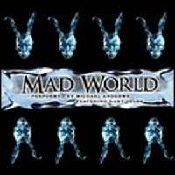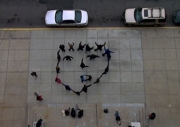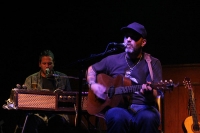|
|
|
Gary Jules |
|
|
Gary Jules has been in the music business long enough to have experienced the good, the bad, and the ugly aspects of his chosen vocation. He released his major label CD a mere 2 weeks before his label was sucked up by another, resulting in the demise of said CD. Then, Jules found himself thrust, unexpectedly, in the international limelight with his cover of Tears For Fears' 'Mad World,' and helped make Hotel Café a successful launching pad for some of the best singer/songwriters performing today. Now, a husband and new dad, Jules is touring behind his new, deeply personal CD and getting ready to move his family to North Carolina. Jules spent some time with Way Cool Music to reflect on his journey so far, the inspiration he gets from family and friends, and why you probably won't see him camping any time soon.
|
|
|
Way Cool: |
Tell us a little about your background and how you got into music. |
| |
|
| Gary Jules: |
I learned how to play guitar and made a band in 7th grade, and then I was here. That’s pretty much what it seems like. I’ve always played guitar ever since I was 10. At 11 or 12, I started a band. When I was 14, I joined my friend, Mike Andrews’, band and have been playing with him ever since so it’s like a blur.
|
| |
|
WC: |
When did start writing your own stuff? |
| |
|
| GJ: |
Well, the suck music started when I was about 15 or 16. Then, the high energy, angsty stuff started when I was 17 or 18. That’s when I would say I seriously started writing. |
|
|
WC: |
Did you record any of your “suck” music? |
|
|
| GJ: |
|
|
|
WC: |
It’s been a few years since Universal released Trading Snakeoil for Wolftickets. What have you been up to in that time? |
|
|
GJ: |

|
|
I was on the road touring with that record for three years before Universal picked it up. I started a residency at a coffee shop (Hotel Café) in Hollywood, brought my PA in there and set it up. It started being a more popular venue. I booked it for a year and ran sound. As it grew, my thing grew, and the record grew. For those three years, I did the Hotel Cafe and it started to take off. Marco (Meneghin) started booking it and I went out on tour. The Hotel Café blew up, and I started to do really well. Then, ‘Mad World' got on the radio, and that was it. It went on for another two years after that. When it’s all said and done, it was like three or four years solidly working 12 to 18 hour days. Once ‘Mad World’ hit in England, everything went totally crazy. I lost touch with everything that I’d been doing before, trying to chase it down. Right before 'Mad World’ hit, I got married. Then, right when ‘'Mad World' was hitting, my wife got pregnant and I was basically on tour for the whole nine months. I got off about two weeks before my son was born and haven’t really done anything since then. I made a new record, by myself, on the floor at my parents’ house in Topanga (California). That’s it. This is the first tour since then. |
|
|
|
WC: |
Universal re-released Snakeoil when ‘Mad World' hit, right? |
| |
|
| GJ: |
Yeah, Universal released it only after it had gone in England. I’d signed with what was an indie label there and did a deal with Sanctuary. Then, after it blew up over there, I was talking with Jack Johnson, a friend of mine, about putting it out through his label. But, it was more like a single and that wasn’t his thing.
|
| |
|
WC: |
Beyond money and fame and fortune, what did 'Mad World' do for your career? |
| |
|
GJ: |
It’s interesting because I take a very blue-collar approach to my music. I didn’t get money, fame or fortune out of it. I had a record deal before that and made a record that disappeared. Basically, the company was sold out from under me after my record came out. That record went to Universal because A&M was bought by Universal. People were like, “Oh God, that’s so horrible.” But then when I put Snakeoil out by myself, I could call the Fox Theater in Boulder to get a booking and the first thing they would say was “former major label artist.” So, even the independent music people pay attention if you’ve been on a major label before. So, it did me a lot of good even if it didn’t do me any good. It didn’t make me any money; it didn’t sell any of my records, but it paved the way for me to do a lot of things myself that I otherwise couldn’t do. |
| |
|
|
By the time that Snakeoil was up and running, people had access to a lot of things they didn’t used to because of the Internet. People could almost release their own records. You could be on iTunes and put it out on CD Baby. And, even then, the idea that I’d been on a major label helped me somehow. Then ‘Mad World' blew up. I didn’t write it, so I don’t get any whatever, but a ton of people have heard of me now. So, when I go back playing my little songs and touring around, I can have my booking agent book a tour for me and my friend, Jim Bianco, and we won’t lose our asses doing it.
I put this record out only on Internet so far and it’s sold quite a few copies because, of the A&M deal and ‘Mad World', a lot of people know who I am. One person is gonna buy the record and tell their friends, “I have a new Gary Jules record. It’s good. I think you should buy it.” They’ve already heard of me so they are more likely to pick it up. It’s all good. It doesn’t transfer or translate in any way, shape or form the way that, I think, a lot of people thinks it does.
|
|
 |
|
| |
|
| |
Because 'Mad World' did so well, and it was in a movie, it makes those other opportunities available. For me, money wise, the captive audience and a director trying to elicit an emotional response from people…my music and what they are trying to do work really well together. The name of the game is to get as many people as possible to have heard of you. If they hear a song and they like it, they might be more apt to buy your record or listen to what you are saying. |
| |
|
WC: |
Did you get any formal or tangible for being the #1 Christmas single in the U.K., like a trophy?
|
|
|
GJ: |
Yeah, that’s exactly what I got. I got a gold record and then I got a platinum record for the single in the U.K. I think I got a gold record in Germany for the album, which is great. I think there is a huge, disparate mass between the starving artist and the superstar. I think there is a lot of room for people to make a good, honest living making music. Honestly, I had a little taste of what it’s like to do that (superstar role), and I don’t have any interest in it at all; I find it embarrassing. I think a lot of times even musicians fall for the thing they are trying to attain, a kind of success. They are constantly being baited to make their success bigger and bigger and bigger through the use of artificial means, which everyone uses. I think a lot of people aim to get bigger than they need to, bigger than their potential is. The quality of work, and personal aspects of the work, tends to suffer when you have to do bigger and bigger things, when you put bigger expectations on yourself for sales; that doesn’t make much sense. I would much rather rearrange the rest of my life to suit how much money I can comfortably make playing music so that I’m not…I’m a ridiculously focused and driven person anyway so I’d make music anyway. But, to sit around and worry about things I can’t control, and particularly try to please a mass audience, is not in the cards for me.
|
|
|
WC: |
Michel Gondry's video for 'Mad World' is stunning. Tell us about the process of making the video. |
| |
|
GJ: |

|
|
We made a video as I was signing my record distribution deal (in the U.K.). They said, “Well, you’re gonna have to make a video because we’re gonna have to have something to put everywhere.” They made what, in my opinion, was a run of the mill, cheesy video that had a lot of current event reference like stock footage of the Iraq war, a picture of Bush and a picture of Hitler. I was like, “You’re so missing the point.” But, we had so many decisions that had to be made at that time that we didn’t have time to do anything about it.
When we came back to the United States, we really wanted to make a good video. We started fielding video treatments from people. They were cool…some sucked, but a lot of them were cool. Someone asked me, “Who would be your guy?” I said, “Michel Gondry,” and they laughed at me. Turns out, he was interested in doing a video before we asked him. I don’t know if he had the idea from the beginning or what the story was. If you watch, the entire thing is one take. It’s not like it took 10 minutes, but it took one day…one incredibly freezing cold day. It’s funny because when you are working with people who are mediocre, you get a ton of attitude. All of the guys that I’ve worked with, that I think are really talented, are completely chill with no attitude. He just showed up and did his thing in one day. |
|
|
|
WC: |
Your new CD is self-produced and on your own label…was that originally the plan? |
|
|
GJ: |
I made a whole other record with the guys that I tour with. We recorded in their studio on ProTools. It was all done, and at the time, this whole thing had happened and my whole world had shrunk. I was a dad, and it was like me and my wife were the only two people in the universe with this new, little person. It didn’t feel right to have this big kind of record. I wasn’t the same person as I was when I wrote a lot of those songs. So, I wrote new songs and re-recorded some of those songs. I started to record the same way as I did Snakeoil, which was two microphones, a small mixer and some tape. As I started recording, I was thinking, “This is what I really want to do.” I really didn’t give a shit if it did anything. I didn’t care if it had legs to be on the radio or any of that sort of stuff, kind of taking my own experience as an example. When we recorded 'Mad World' we didn’t think anything about it and look what happened. The rest of the time I played music, nothing ever happened…nothing like that. It’s like planning for the end of your life, you just can’t do it. If it happens, it happens, if it doesn’t, it doesn’t. I’m not 22 anymore. I’m grown up and have a baby. But, I’m the same person, and the process of writing music, and trying to communicate what’s going on with me, is just as important to me as it was when I was 22. The ideas are not probably as topical anymore because I’m not as hell bent as trying to say something important anymore. It’s more internal now.
|
|
|
WC: |
How did you form the relationship with CD Baby? What have they done for you? |
| |
|
| GJ: |
Again, Jack Johnson came to me through a friend in San Diego who was a professional surfer. I passed him along, and he signed with another friend of mine, Andy Factor, who released the Donnie Darko score. He was selling on CD Baby and told me all about it. It was just so simple. Derek (Sivers, CD Baby founder) is himself the real deal. He’s had every opportunity to cash in. It’s Derek that I am in with. There’s a billion ways to sell your CD now. He does things for people that you don’t have to do. The guys that have as little time as him certainly don’t do things like he does. I’ve tried hard in my career to help other musicians, and I don’t think a lot of musicians do…Derek puts us all to shame. All of the money he was making was all going back into CD Baby, his ideas, and his money. He was living like he always was. CD Baby blew up before Derek ever bought a new car or anything. It sounds superficial, but it’s a big thing. The first check that I got from the record company for ‘Mad World' I went out and bought a huge T.V. I should have bought health insurance. I knew better, but I couldn’t help it. Derek is not that guy. |
|
|
WC: |
‘Whiskey for Everybody’ is my favorite track from the new CD. What was the inspiration behind the song?
|
| |
|
GJ: |
My wife was pregnant, I was flying all around the world, and the logistics of just getting to speak with her for five minutes every day was out of control. And, my best friend, Mike Andrews, who I made 'Mad World' with, he and I were struggling to be just you and me on the phone. His lawyer would call my lawyer and my manager would call my publicist to call somebody to talk to him. It would get back to him as, “Gary said, ‘blah, blah, blah’.” Well, Gary didn’t really say that. I said one thing, my manager would interpret it one way and he talked to a lawyer who, then, talked to someone else.
I was flying into Ireland and I felt very disconnected to everything that was important to me. It reminded me of when, in literature, the protagonist is going to be separated from everything else in order for his mettle to be tried. And, I felt like this was the trial for me. At that moment, it flooded in how lonely I was. On tour, in a car by myself, it’s a big production that climaxes with the show. Then, you go to bed and leave town the next morning to start the whole thing over again with not one person who was there the night before. On the tour that I was doing then, with all the interviews I was doing, it was like every two hours I’d see a whole new batch of people. To save money, they didn’t send one person that I knew to go with me.
When I sing "I miss your face," I was talking to my wife and to our son. On the second verse, it’s my wife and baby talking to me saying, “You have to go, but it still sucks.” I listen to it sometimes and think, “Wow, it’s like one of those ‘70s on-the-road songs,” like ‘Leaving On A Jet Plane.’ But, that’s exactly where I was. That’s the span of what all of my self-indulgent intellectual pursuit had gotten me. It was that simple. |
|
|
WC: |
What are some of the songs from the new CD that you enjoy playing live? |
| |
|
| GJ: |
I’m a very nervous singer and am personally connected to the songs. The first song (‘Falling Awake’) is basically about doing something you love for a living that is really a hard thing to do. When you take something that is precious to you and shove it in a money machine, it might turn out to be a really horrible thing. In part, I was writing about my friend, Ben Peeler, who is always out on the road, and all these guys who are always on the road doing this thing. No one is getting rich, but they keep doing it. To me, there’s a certain honor in the hours spent, the time away and the things they miss out on, but they keep doing it.
All the songs are all really super personal. The last song (‘One Little Light’) is basically another song on an airplane talking about what it’s like chasing a big, gigantic single around the world. If you hear it in context, it’s totally self-explanatory.
|
|
 |
|
| |
|
| WC: |
Which songs get the most audience reaction from? |
| |
|
| GJ: |
It depends on what kind of night it is. If it’s a really mellow night, ‘Whiskey for Everybody’ gets people a lot. The first song really gets people, but I don’t know why. ‘Gone Daddy’ is about realizing that, after 20 years in Los Angeles, I didn’t need to live there anymore, and that in order to give my son the kind of life I wanted to, it was almost imperative that we leave Los Angeles. It was sad for me because it meant admitting that California was over. |
| |
|
| WC: |
Tell us about moving from Los Angeles to North Carolina. |
| |
|
| GJ: |
We, actually, haven’t moved yet. It’s very seldom in your life when things become so clear. I’d been in Los Angeles for so long and this huge thing had happened. I came to L.A. to go to college and stayed to play music. Then, I stayed because I was lost and a drug addict. I was into really bad stuff, but always playing music. I was always trying to get something started. And, then it did get started and then disappeared when the first deal was over. I freaked out and totally went off the deep end. I, eventually, cleaned up and went back to UCLA and got a degree, and then made Snakeoil. I never thought I would leave Los Angeles; it was where my whole life had happened. One day I thought that, in order to have the things I wanted for my kid, I’d be on the treadmill forever. If we went somewhere else, I could get off the treadmill, make my own decisions about things and, maybe, not have to sell a bazillion records all the time. Maybe I could open a coffee shop eventually. And, if I ever get tired of the road, which I haven’t yet, I don’t know if I’m gonna want to do this forever. I’d hate to be 45 or 50 and not have another way to make a living. |
| |
|
| WC: |
Are you still afraid to go outside at night in North Carolina? |
| |
|
| GJ: |
I would much rather walk out into a gunfight than into the woods. I just don’t know anything about it! Where I’m gonna live, it’s so slow. At other times in my life, it would have driven me crazy, but all I want now is more time. My wife can walk anywhere at any time and her family is there. My kid can ride his bike around. It never occurred to me that there are still places without busy streets or without retail establishments spreading for 50 miles in every direction. That said, I’m gonna open a coffee shop. It’s on the mind of a lot of people I know; they talk about getting out of the “rat race.” The thing about North Carolina is that there aren’t 8 gazillion people fighting for the same thing. Eventually, you say, “I choose for it to be this way.” |
| |
|
|
|

|
|
|
What's the worst job you've ever had?
|
|
The worst job I ever had was construction. |
| |
|
|
What's your favorite movie quote or song lyric?
|
|
Historically, my favorite song lyric is, “Living is easy with eyes closed/Misunderstanding all you see/It’s getting hard to be someone, but it all works out/It doesn’t matter much to me.”Right now, probably the thing that amps me the most are semi-religious songs that are reggae or country songs like Hank Williams’s lyrics, “I saw the light/No more darkness, no more night.” I love the lyrics, “Grace Cathedral Hill/All wrapped in bones of setting sun/All dust and stone and moribund/I paid twenty-five cents to light/A little white candle.” That’s ‘Grace Cathedral Hill’ by The Decemberists, I love it. |
| |
|
|
Who would you want to star in the movie of your life?
|
|
I think every American male would want it to be Johnny Depp or Leonardo DiCaprio. But, I’d be more likely to be like Philip Seymour Hoffman. |
| |
|
|
What's your favorite TV theme song?
|
|
Hands downs (humming Sanford and Son theme). |
| |
|
|
If you were a superhero, what would your name be?
|
| |
Wow. If I were a superhero, hopefully, it would be like “Otherman." |
|
|
|
What do you want to be when you grow up?
|
|
A good dad. |
| |
|
|
Finally, why are there so many songs about rainbows?
|
|
I don’t know if there really are. I’ve been thinking about that one and I couldn’t come up with any. Alexander Pope said in an essay on criticism, “True wit is nature to advantage drest/What oft was thought, but ne’er so we exprest.” I think there’s something about isolating our very complicated lives in very simple, not necessarily truths with a capital T, but things that say something that everyone can relate to. Unfortunately, I think people write songs that try to make pictures of rainbows when I think they should just sit there and watch them, with a bunch of other people, hopefully.
|
|
|
|
|
|
To find out more information about Gary Jules, visit his website at www.garyjules.com.
|
|
|
|
|
|
|